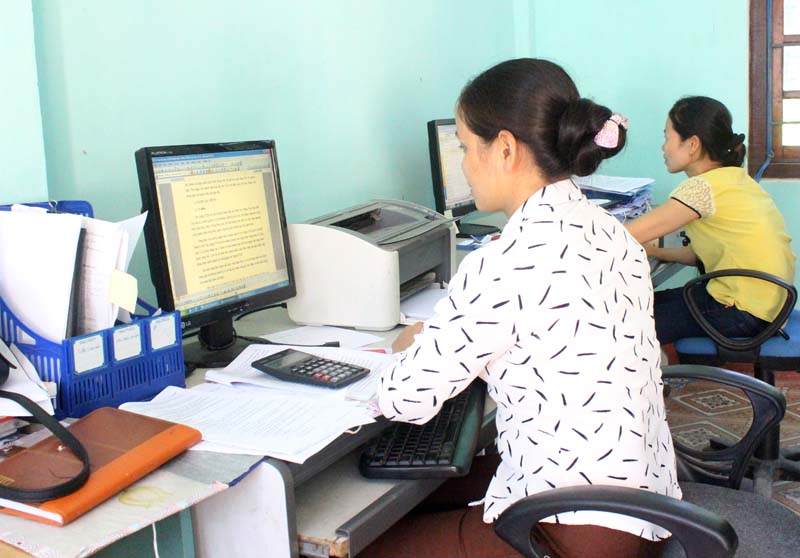
HBO - As a result of Hoa Binh’s emulation movement to a build lifelong learning society, nearly 68 percent of rural workers have learned knowledge and skills, and technology transfer at community learning centres. Meanwhile, 93 percent of the workers have engaged in vocational training, and more than 75 of them belong to the highly skilled workforce of the province’s spearhead economic sectors.
 Officials in the
difficult commune of Lac Sy (Yen Thuy) actively learn and apply IT to improve
their work efficiency.
Officials in the
difficult commune of Lac Sy (Yen Thuy) actively learn and apply IT to improve
their work efficiency.
Illiterate eradication and education universalisation are
the first goals set for the construction of a learning society. Therefore, over
the past time, all levels and branches in the province have come up with
effective solutions to organise literacy classes for adults. As a result, by
the end of 2018, the rate of people aged 15-60 years old with literacy level 1
in the entire province reached 99.65 percent; and those of the same age group
with literacy level 2 reached 97.68percent. Meanwhile, the rate of people aged
15-35 years old with literacy level 1 reached 99.92 percent. All of its 11
districts and cities met standards on the preschool universalisation for
5-year-old children, the secondary educational univesalisation level 2, and
illiterate eradication level 2. The rate of attendance at the right age for
primary and secondary education reached 100 percent, with 80 percent of
children with disabilities, who are in primary school age, attending school.
Quach The Tan, Chairman of the provincial Study
Encouragement Association, highlighted that for adults, the movement focuses on
improving the competence level of computer, foreign languages, professional,
and labour skills.
The lifelong learning campaign also promotes sharpening life
skills, and building a better personal and community life. In the past five years,
life skills teaching as part of academic education, particularly via
extra-curricular activities, have attracted the participation of 94.3 percent
of local students.
The quality of learning centres in Hoa Binh’s communes,
wards and towns has been continuously improved, creating favorable learning conditions
for many people, especially the rural workforce, women and people with
disadvantaged backgrounds.
The Department of Education and Training of Hoa Binh province held a conference on March 18 to review the performance of the "Safe and Happy School" Project and set out tasks for 2025. The project, funded by the Taiwan Fund for Children and Families (TFCF), aims to create a safe, inclusive, and supportive learning environment for students. The event saw the attendance of representatives from the TFCF and 26 beneficiary schools.
With over 70% of their workers being women, trade unions across industrial parks (IPs) in Hoa Binh have been actively safeguarding their legal rights and interests while implementing initiatives to improve their income and well-being.
In recent years, the Hoa Binh provincial General Hospital has continuously innovated itself and improved the quality of medical services to meet the increasing needs of local people. With substantial investments in infrastructure and modern equipment, along with a team of highly qualified doctors and nurses, the hospital has gradually established itself as one of the leading medical units in the Northwestern region and a trusted destination for healthcare for people inside and outside the province.
From mastering the fundamentals of programming to achieving national recognition, the Programming Club of the Le Van Tam Primary School (STAR LVT28) in Hoa Binh city has made remarkable strides in the field of robotics.
The Ho Chi Minh Communist Youth Union Committee and the Vietnam Youth Federation chapter of Hoa Binh province organised a programme on March 12 to launch the "Digital Literacy" movement and an online quiz on the resolutions of the Vietnam Youth Federation congresses at all levels, as well as the Politburo's Resolution No. 57-NQ/TW on breakthroughs in the development of science, technology, innovation, and national digital transformation.
As climate change grows more unpredictable, the development of production forests has become essential - not just for economic growth, but for safeguarding the environment and maintaining ecosystem balance. By boosting local incomes, curbing natural disasters, preventing soil erosion, and protecting water resources, these forests play a crucial role in sustainable development.



 Officials in the
difficult commune of Lac Sy (Yen Thuy) actively learn and apply IT to improve
their work efficiency.
Officials in the
difficult commune of Lac Sy (Yen Thuy) actively learn and apply IT to improve
their work efficiency.